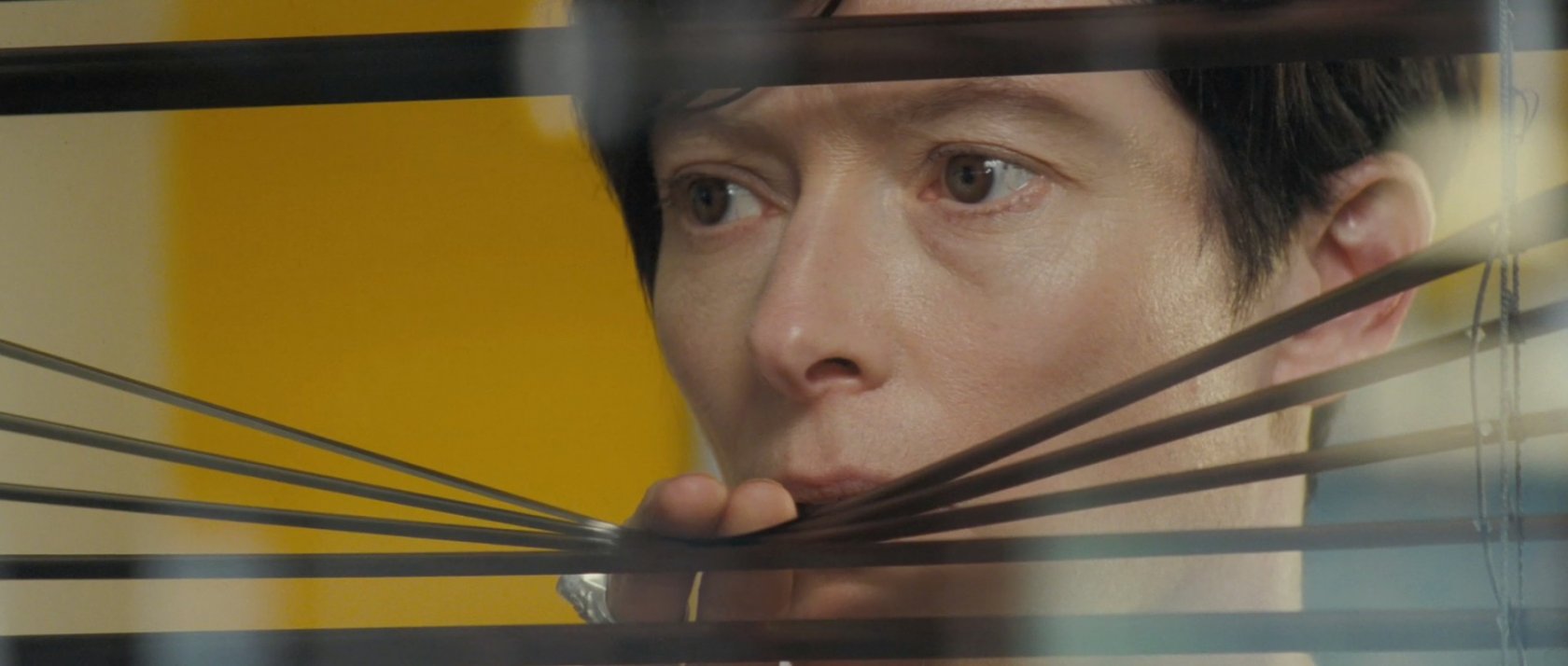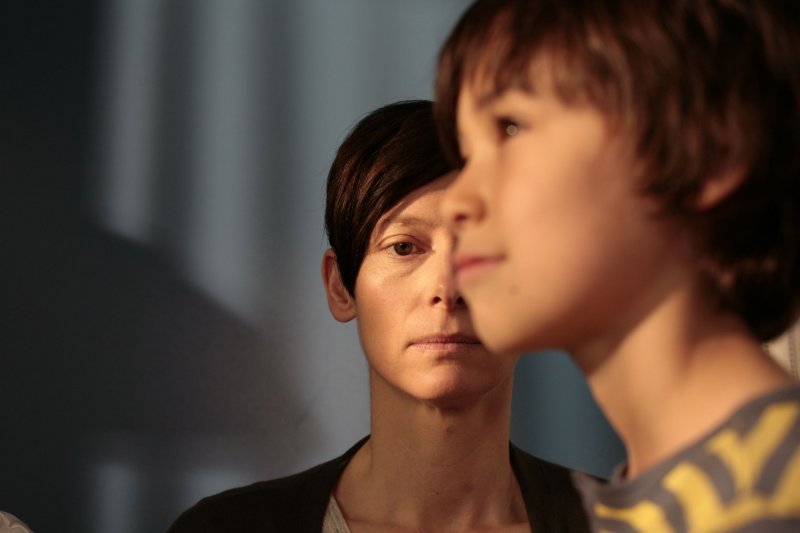Review
We Need to Talk About Kevin
by Thomas Rodrigues
Kevin massacres his schoolmates. While we as an audience do not witness the killing spree until the climactic moments of Lynne Ramsay's We Need to Talk About Kevin, this revelation hardly qualifies as a "spoiler." Kevin's ultimate transgression is all but revealed within the first fifteen minutes of the film. Ramsay is less concerned with making us wonder, "Will he?", than with asking us, "Why?" And she certainly does ask us. We Need to Talk About Kevin does not provide any easy answers, but rather revels in its own ambiguity and leaves the viewer with a lot to ponder.

Tilda Swinton as Eva Khatchadourian in We Need to Talk About Kevin
The film, Ramsay's third feature-length effort, centers on Kevin's mother, Eva Khatchadourian. Linear storytelling is eschewed in favor of a series of flashbacks interspersed among scenes from Eva's post-massacre life, a technique which, presumably intentionally, unsettles the viewer. As the story progresses, it is revealed that Kevin exhibited troubling behaviors at an extremely early age. He refuses to play simple games with Eva, he feigns an inability to be potty-trained, he willfully creates messes wherever he goes. Eva is far from a naturally maternal woman, and becomes visibly frustrated by her son's antics, much to his delight. As this cycle continues — misbehavior, frustration, retaliatory misbehavior, punitive action — and Kevin's trespasses become more and more twisted, we begin to wonder who is at fault. Did Eva mold Kevin into a sociopath by providing inadequate parental care or was Kevin born an inherently evil individual? It is a simple question of nature versus nurture, but one posed with such tact that it is far from sophomoric.
And it is indeed tact, on both Ramsay's part and the part of her actors, which holds We Need to Talk About Kevin together. Granted, the film's symbolism is far from subtle, sometimes even bordering on being over-the-top, but it embraces its moments of brashness much like Darren Aronofsky's Black Swan did a year or two ago. Like Black Swan, We Need to Talk About Kevin is, at its core, a portrait of a fractured psyche. Eva, even prior to her son's crime, is mentally and emotionally distraught. Seemingly petty occurrences trigger exaggerated reactions from Ramsay's protagonist, a pattern that not only justifies but demands heavy-handed symbolism. By drenching her film in a rich palette of reds, throwing an abundance of Christian metaphors in our faces, and utilizing an eerily deathly soundtrack, Ramsay isn't foregoing nuance, but rather showing us what it is like to be Eva, what it is like to experience the world as she does.

Rock Duer as a young Kevin and Swinton as Eva
With Eva functioning as the crux of the film, it was essential that Ramsay select an actress who could walk the fine line between sanity and insanity, between eccentricity and neurosis. And who better than the tragically under-appreciated Tilda Swinton (probably the best actress of her generation)? Swinton turns in a monumental performance, capturing each facet of Eva's character — the frailty, the insecurity, the aggressiveness, the haughtiness — almost perfectly. She joins a long list of actresses (Kirsten Dunst, Juliette Binoche, Anna Paquin, Leila Hatami, Keira Knightley, Elizabeth Olsen) who were far more deserving of a Best Actress nomination at this year's Academy Awards than Meryl Streep, Glenn Close, Rooney Mara, or Michelle Williams (in my estimation, Viola Davis was the only deserving nominee). Swinton is able to switch from devastated to defensive and back in the blink of an eye, portraying Eva's inner turmoil with the utmost precision. Her gaunt, androgynous visage only adds to this effect, making Eva seem more wraith-like than human
In support of Swinton, Ramsay draws two excellent performances from relative newcomer Ezra Miller and the increasingly reliable John C. Reilly. Fortunately for the film, but, perhaps, unfortunately for him, Miller simply looks evil. Feline eyes, pale skin, and angular cheekbones make Miller as physically-suited for his role as Swinton is for hers. But that is not to take away anything from Miller's acting abilities. He exudes the over-confidence, charm, and shiftiness that we expect a sociopath to have. Ramsay could have written a little more nuance into the character of Kevin — he is, until the very last scene, almost a simple embodiment of evil — but Miller does a very commendable job with what he has to work with. Similarly, Reilly delivers an entirely believable performance as Eva's husband, Franklin. Admittedly, Franklin is written a bit thinly, especially in comparison to Eva, but Reilly plays him off as a likable, albeit overly optimistic and slightly bumbling, father-figure.
By combining this trio of top-notch performances with stunning cinematography, innovative storytelling, and an unbelievably well-constructed aura of dread and terror, Lynne Ramsay crafted one of the finest psychological thrillers/dramas of the past few years. Sure, the supporting characters could have been slightly more complex, but this is but a minor qualm. Ultimately, the effectiveness of We Need to Talk About Kevin is only felt once the massacre begins to unfold. We know for the entire film that it is coming. The perceptive viewer is able to intuit the weapon, the day, the location — nearly all the details. And yet, when it comes, it is still shocking, powerful, and devastating, all without being particularly graphic. Ramsay disturbs the audience enough in the first hour and a half of the film that, come the conclusion, even the known, the predictable, seems foreign, unnerving, unexpected. As I was leaving the theater, one of my co-viewers, a pregnant woman, remarked only half-jokingly to her husband, "Now I'm a little bit scared." That seed of uncertainty, that nagging sense of parental doubt, is the essence of We Need to Talk About Kevin. Not exactly a positive message, but a powerful one, no doubt.